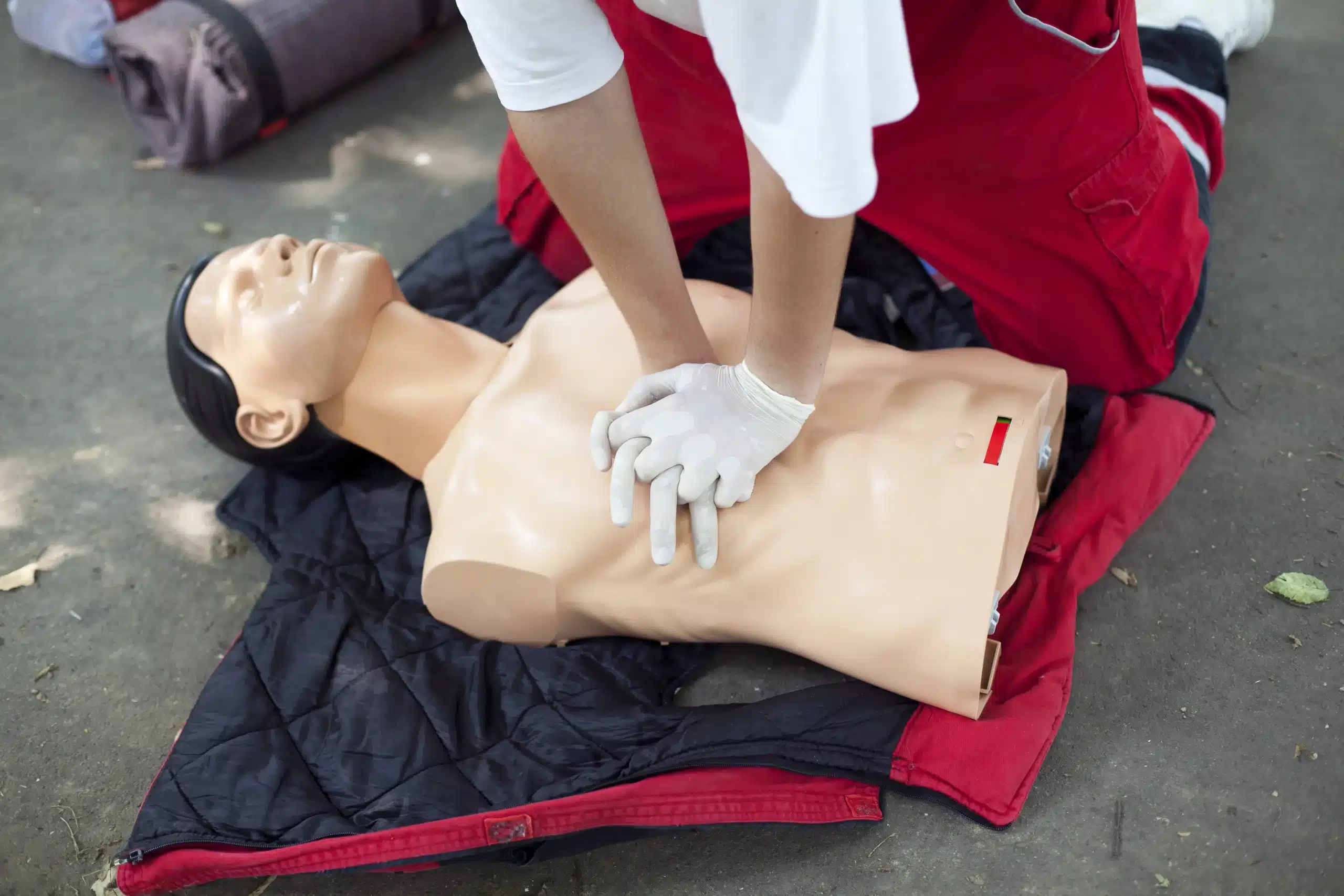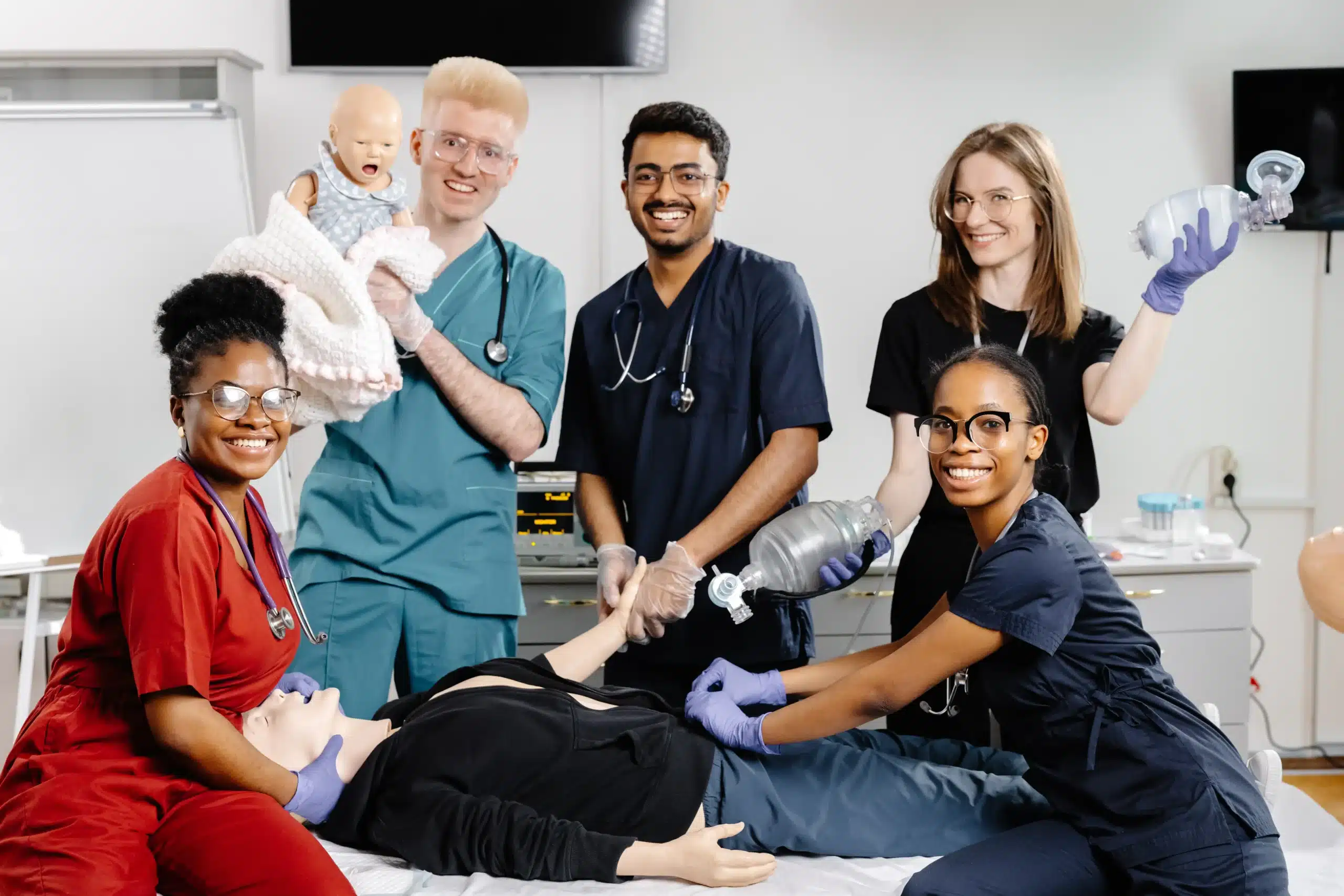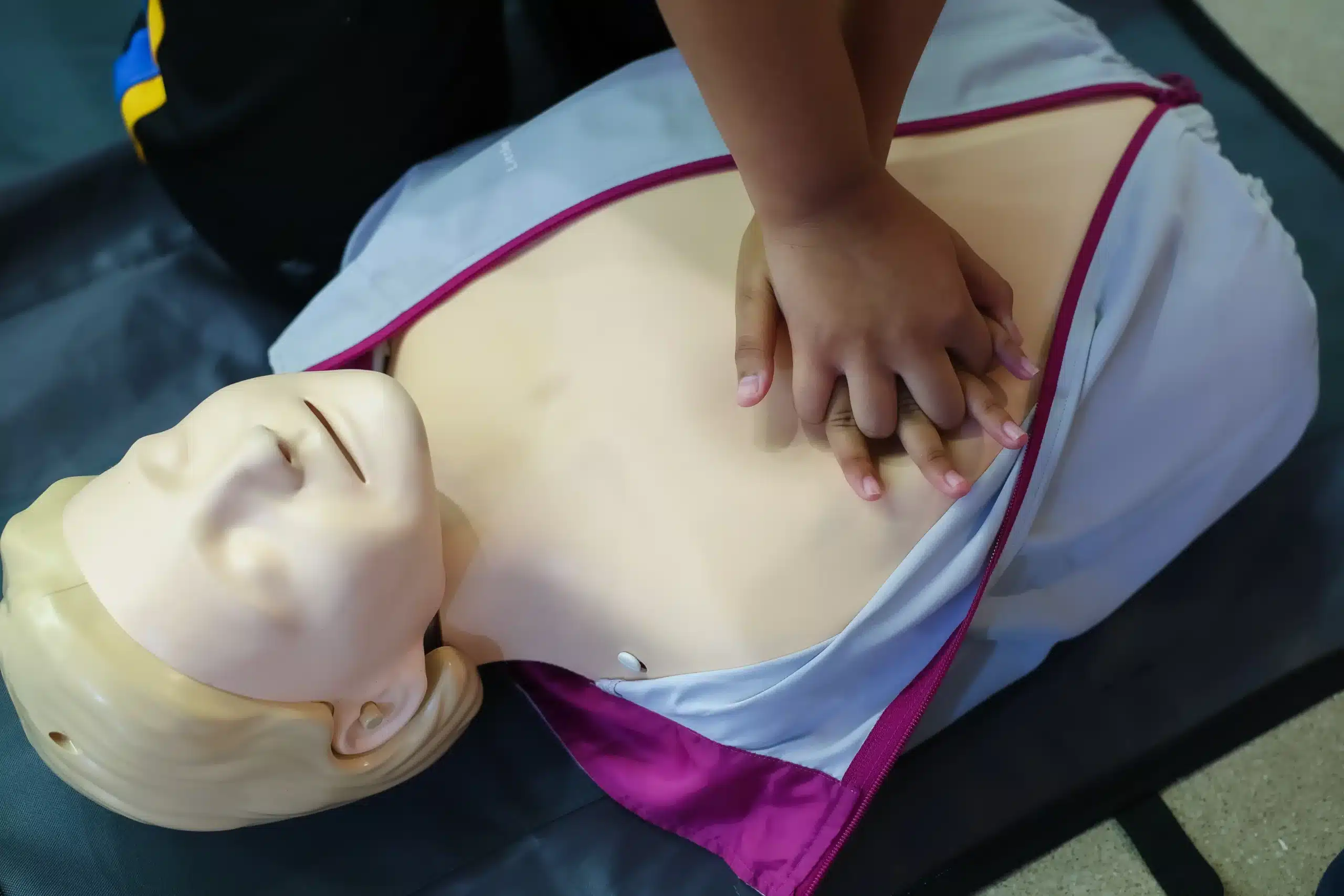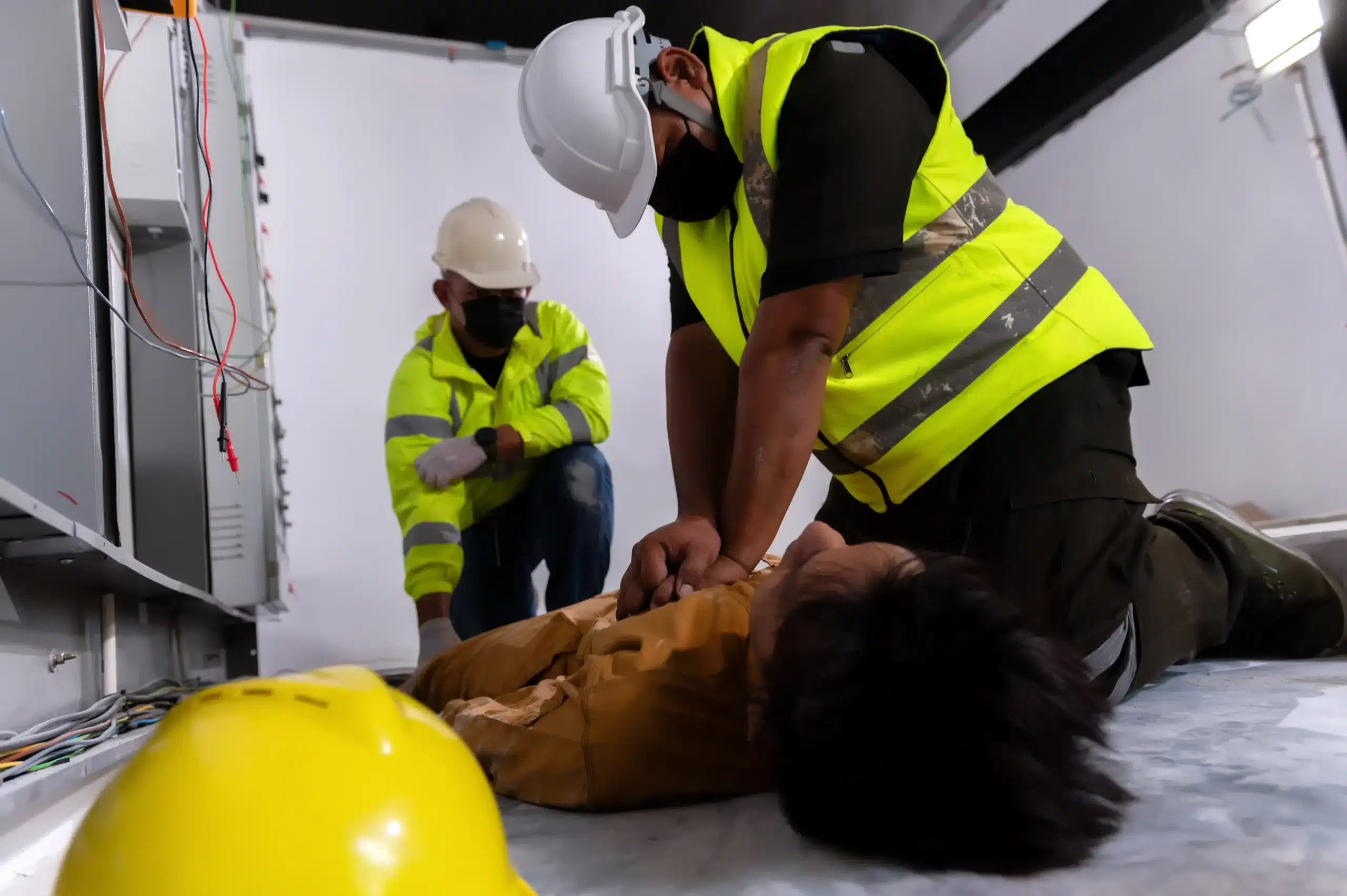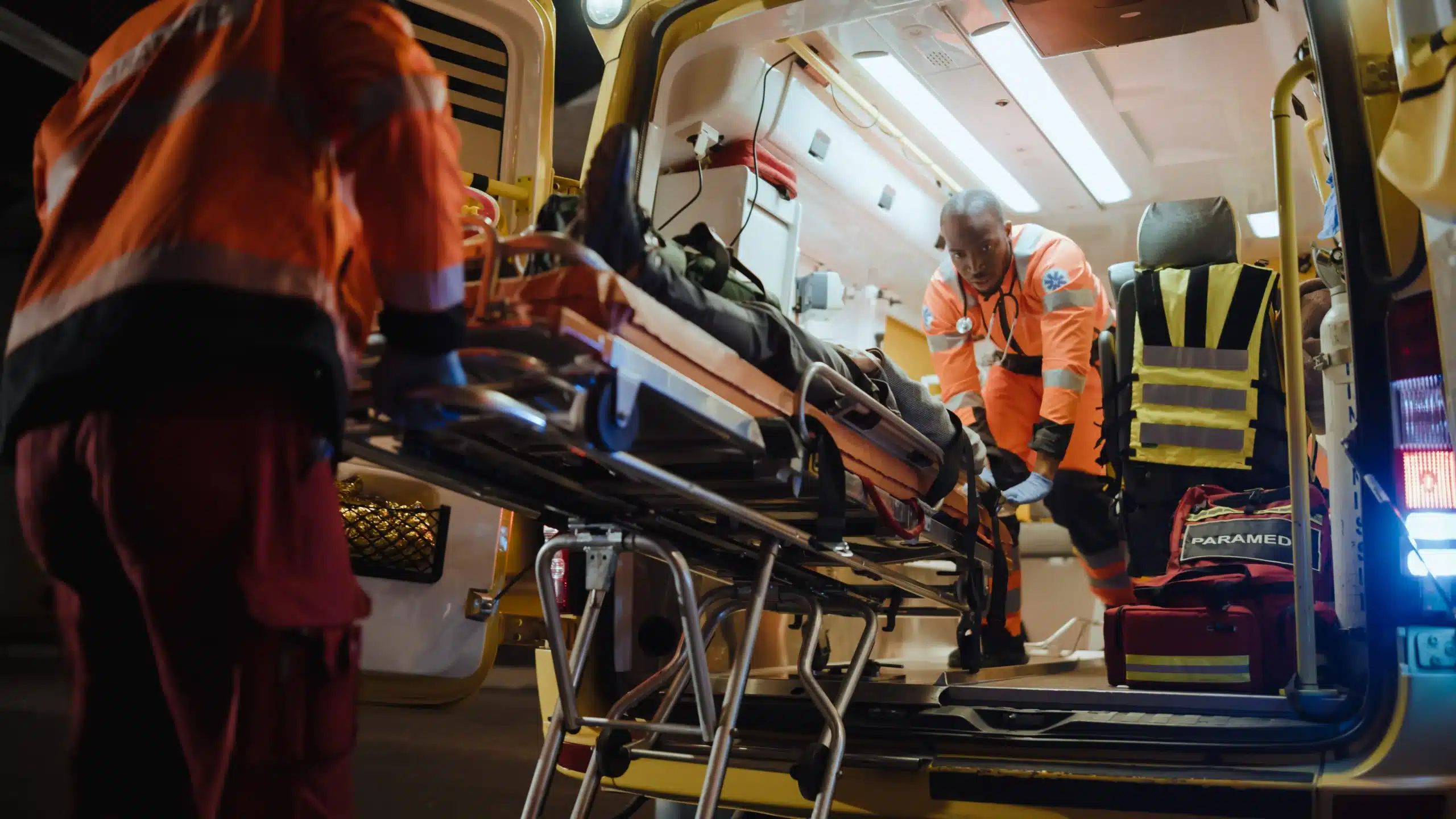Accidents happen, and when they involve children, knowing how to respond quickly and effectively can be life-saving. Pediatric CPR and first-aid training in Delano provides individuals with the essential skills to handle medical emergencies involving infants and children. This article will delve into the importance of this training, highlighting the specific techniques used in pediatric CPR and first aid. We’ll explore the various training options available in Delano, discuss the course content and certification process, and address common misconceptions surrounding CPR training. Whether you’re a parent, caregiver, or childcare professional, this guide will equip you with the knowledge and resources you need to feel confident and prepared in any situation.
Key Takeaways
- Pediatric CPR and first aid equip you to handle childhood emergencies. These skills empower you to respond effectively to various situations, from minor injuries to life-threatening events. Find training that meets your specific needs, whether you’re a parent, caregiver, or childcare professional.
- Select a course that aligns with your needs and learning style. Consider factors like course content, duration, schedule, and format (in-person or blended learning) when making your decision. Ensure the provider offers reputable certifications, such as those from the American Heart Association or the American Red Cross.
- Stay current with your certification and refresh your skills. Regularly renew your certification and pursue continuing education opportunities to stay up-to-date on the latest guidelines and techniques. This ensures you’re always prepared to provide effective care in an emergency.
What is Pediatric CPR and First Aid?
Pediatric first aid and CPR training gives parents, caregivers, and anyone working with children the skills to respond to emergencies. It covers a range of topics, from treating minor injuries like cuts and burns to managing life-threatening situations like choking and cardiac arrest. Knowing how to assess a child’s condition, deliver appropriate first aid, and perform CPR can dramatically improve their outcome. This specialized training focuses on the unique needs of infants and children, giving you the confidence to act quickly and effectively in a crisis.
How Does it Differ from Adult CPR?
While the basic principles of CPR remain consistent, there are important differences between adult and pediatric CPR. Infants require CPR using two fingers because of their smaller and more delicate chests. Children over one year, on the other hand, need one hand for chest compressions, while adult CPR uses two hands. Pediatric first aid also emphasizes choking, as it’s a more common occurrence in children given their quicker eating and drinking habits. Understanding these distinctions is crucial for providing safe and effective care during a pediatric emergency. For a deeper look at these differences, check out this helpful article comparing adult and pediatric first aid.
Why is it Important for Child Safety?
Learning pediatric CPR and first aid is a crucial investment in child safety and should be considered essential for any parent or caregiver. Thousands of children in the US require CPR in hospitals every year due to cardiac arrest. Sadly, while many survive the initial event, not all make it home from the hospital. Kidsville Pediatrics discusses why infant CPR training is so important for emergency preparedness. Being prepared to handle emergencies can significantly increase a child’s chances of survival and a full recovery. First Response Safety Training also stresses how important CPR and first aid training is for parents. These skills empower you to protect the children you care for.
Pediatric CPR and First Aid Training in Delano
Finding the right pediatric CPR and first aid training is crucial for anyone regularly around children. Luckily, Delano offers several choices to fit your needs. Let’s look at some training providers in the area:
Safety Training Seminars
Safety Training Seminars offers various American Heart Association (AHA) certified courses, including options in Delano. While they serve a broader region, their established presence and course variety make them a convenient option for comprehensive training. They equip participants with essential skills for responding to emergencies involving children.
CPR Plus
CPR Plus focuses on CPR training in Delano. Their Pediatric First Aid CPR AED course gives participants the skills and confidence to handle emergencies involving infants and children. They cater to various professions, including childcare providers and educators, making their training relevant for those working with young children.
Always CPR Training
As a National Training Center, Always CPR Training offers the Pediatric First Aid CPR AED course locally in Delano. Their specialization in AHA courses ensures high-quality instruction and certification. This provider suits those seeking a nationally recognized program within their community.
Delano CPR Classes
Delano CPR Classes provides AHA-certified training designed for medical and healthcare professionals. Their Pediatric CPR and First Aid courses equip those working with children with the latest techniques. If you’re a healthcare provider in Delano, this specialized training can enhance your professional skills.
Compare Pediatric CPR and First Aid Courses
Understanding the differences between Pediatric CPR and First Aid courses can help you choose the right training. While both are essential for child safety, they cover different skills and situations.
Course Content and Skills
Pediatric First Aid courses focus on recognizing and responding to common childhood illnesses and injuries. Think cuts, burns, allergic reactions, and choking. You’ll learn how to assess a situation, provide basic care, and decide when to get professional medical help. Pediatric First Aid training gives parents and caregivers the confidence to handle these situations. Pediatric CPR, however, focuses specifically on life-saving techniques for children experiencing cardiac arrest or breathing emergencies. You’ll learn chest compressions, rescue breaths, and how to use an AED (Automated External Defibrillator) if one is available. Some courses combine CPR and First Aid, offering well-rounded training in a single program. The Importance of First Aid and CPR Training for Childcare Providers and Parents emphasizes how vital these skills are for anyone caring for children.
Duration and Schedule
The length and schedule of these courses depend on the provider and the content. A combined Pediatric First Aid and CPR course designed for California childcare providers often takes about eight hours and usually includes AED training. Shorter courses might focus only on CPR or First Aid, letting you tailor your training to your needs. Many providers offer flexible schedules, including evenings and weekends. You can also find blended learning that combines online modules with in-person skills practice.
Certification and Recognition
After completing a Pediatric CPR or First Aid course, you’ll receive a certification card. Ensure the course aligns with the requirements of your profession or licensing, especially in childcare or healthcare. In California, childcare providers need certification that meets Title 22 and Emergency Medical Services Authority (EMSA) rules. Look for courses with certification from reputable organizations like the American Heart Association or the American Red Cross. These certifications are usually valid for two years, then you’ll need a refresher course.
Cost of Pediatric CPR and First Aid Training
Knowing the cost of training is a practical first step. Let’s break down the expenses associated with Pediatric CPR and First Aid certification in Delano, California.
Pricing Factors
Several factors influence the cost of these courses. The type of certification you pursue plays a significant role. For example, a basic CPR/AED/First Aid certification might cost $24.99, while a BLS Healthcare Provider certification could be around $34.99, according to CPR Test Center’s pricing information for Delano. The level of instruction, course materials, and instructor experience also contribute to the overall price. Some providers may offer discounts for group registrations or returning students. Remember to check with your chosen provider for specific details.
Average Delano Costs
In Delano, the cost for combined CPR and First Aid training varies. A basic CPR/AED/First Aid course from a provider like CPR Test Center may be under $35. More comprehensive training, such as the eight-hour EMSA-approved course from Cherry Tree Group (designed for childcare providers), will likely have a higher price tag. For healthcare providers seeking BLS certification, Adams Safety’s BLS/CPR training is another option, with prices around $80. Contacting providers directly is always recommended for the most up-to-date pricing. Our team at Safety Training Seminars is also happy to answer any questions you may have. You can reach us through our contact page.
Value for Your Money
Think of these courses as an investment in vital skills. Beyond the certification itself, consider the long-term value. Delano CPR Classes offers various courses, including BLS, ACLS, and PALS. These advanced certifications can be especially valuable for healthcare professionals. When comparing costs, factor in the comprehensiveness of the curriculum, the quality of instruction, and the reputation of the certifying organization. A slightly higher cost might provide more in-depth training and better prepare you for real-life emergencies. Consider what will best equip you to confidently respond when it matters most.
What to Expect in a Course
Knowing what awaits you can help you feel prepared and confident going into your Pediatric CPR and First Aid training. These courses typically combine classroom learning, hands-on practice, and assessment.
Classroom Learning
Expect to cover the fundamentals of pediatric first aid and CPR in a classroom setting. This includes recognizing emergencies and understanding how to respond effectively. You’ll learn about common childhood injuries and illnesses, allergic reactions, and life-threatening situations like choking or drowning. This foundational knowledge gives parents and childcare providers the skills to react confidently in a crisis, just as ChildCareEd emphasizes.
Hands-on Practice
Hands-on practice is where you’ll put your new knowledge into action. Using CPR training mannequins, you’ll practice chest compressions and rescue breaths, learning the correct techniques and depth for infants and children. This practical experience is essential for building muscle memory and confidence, allowing you to react effectively in stressful situations. Emergency First Response discusses the value of hands-on training with mannequins.
Assessment Methods
To ensure you’ve grasped the material, Pediatric CPR and First Aid courses include assessments. These typically involve both written exams and practical demonstrations. You’ll be evaluated on your understanding of the concepts covered in the classroom and your ability to perform CPR and first aid techniques correctly. The National Safety Council highlights the importance of being able to take action in medical emergencies and provide basic life support.
Benefits of Pediatric CPR and First Aid Training
Knowing how to respond to a medical emergency involving a child can make all the difference. Pediatric CPR and First Aid training empowers individuals with the skills and confidence to act quickly and effectively. Let’s explore the benefits for different groups.
For Parents and Caregivers
As a parent or caregiver, your child’s safety is paramount. Pediatric first aid training gives you the skills to handle common childhood emergencies, from minor cuts and scrapes to more serious situations like choking or allergic reactions. This knowledge allows you to respond confidently and provide immediate care while waiting for professional medical help. It’s an investment in your family’s safety and well-being, offering peace of mind and the ability to react effectively under stress. Online pediatric first aid courses offer a convenient way to gain these crucial skills.
For Childcare Professionals
For childcare providers, pediatric first aid and CPR training is invaluable, and often a requirement. These skills are essential for maintaining a safe and healthy environment. This training equips professionals to respond to various emergencies, including choking, drowning, and allergic reactions. In California, complying with Title 22 and EMSA regulations for childcare providers often involves specific certifications. These certifications demonstrate a commitment to safety and professionalism, reassuring parents.
Community Impact
When more people in a community are trained in pediatric CPR and first aid, it creates a safer environment for everyone. Parents gain confidence knowing they can potentially save a child’s life, and childcare centers become havens of preparedness. Local resources like Delano CPR Classes contribute to this community-wide safety net. The more individuals equipped with these life-saving skills, the stronger and more resilient the community becomes. This collective preparedness fosters a sense of security and mutual support.
Common Misconceptions
When it comes to pediatric CPR and first aid, several misconceptions prevent people from seeking out this life-saving training. Let’s clear up a few of these misunderstandings:
“It’s Only for Healthcare Professionals”
Many assume that Pediatric Advanced Life Support (PALS) certification is only beneficial for doctors and nurses. While PALS is undoubtedly crucial for healthcare professionals, this training is invaluable for anyone regularly around children. Parents, teachers, childcare providers, camp counselors, and even babysitters can benefit from understanding how to respond effectively in a pediatric emergency. Knowing what to do can empower you to act quickly and confidently when a child’s life might depend on it. PALS training provides comprehensive instruction in pediatric emergency care.
“Basic CPR is Enough for Children”
Some believe basic CPR training covers everything needed to help a child in an emergency. While basic CPR knowledge is essential, it doesn’t address the specific physiological differences between children and adults. Pediatric Advanced Life Support (PALS) training provides the specialized techniques and knowledge necessary to respond effectively to emergencies involving infants and children. It goes beyond the basics of adult CPR to equip you with skills tailored to a child’s unique needs. Consider taking a BLS course to build a strong foundation in basic life support techniques.
“The Training is Too Difficult”
Hesitations about the complexity of the training often deter people from pursuing CPR certification. In reality, these courses are designed to be accessible and practical, focusing on hands-on skills and building confidence. Certified instructors guide you through the process step by step, ensuring you feel prepared to apply what you’ve learned in a real-life situation. Don’t let the fear of performing CPR incorrectly hold you back from gaining these essential skills. CPR and first aid training is designed for everyone. Our low price guarantee makes these courses accessible to everyone.
“Emergencies Won’t Happen to Me”
It’s easy to think that emergencies are unlikely to happen, but the truth is, they can occur unexpectedly. Accidents involving children can happen anywhere, from the playground to your own home. Being prepared with CPR and first aid training can make all the difference in those critical moments. Equipping yourself with these skills isn’t about dwelling on the negative; it’s about empowering yourself to protect the children in your life. Browse our available BLS courses in Visalia to find a class that fits your schedule.
Choose the Right Course
Finding the right pediatric CPR and first aid course takes a little planning. It’s not one-size-fits-all, so consider these factors to make the best choice.
Assess Your Needs
Before browsing courses, think about why you want pediatric CPR and first aid training. Are you a parent preparing for emergencies at home? A childcare provider needing certification? Or a teacher wanting to improve your skills?
A parent might prioritize basic life support for infants and toddlers, while a childcare provider might need more comprehensive training, like handling allergic reactions and common childhood injuries. Understanding your needs will help you choose a course covering the relevant skills and knowledge. For example, online pediatric first aid training offers valuable resources for parents and caregivers.
Evaluate Provider Credentials
Not all CPR and first aid certifications are equal. Look for courses accredited by reputable organizations like the American Heart Association or the American Red Cross. This ensures the curriculum meets established standards, and your certification will be widely recognized. Ask potential providers about their instructor certifications and the training program they use. A legitimate provider will gladly share this information. Our Low Price Guarantee ensures you receive high-quality training at a competitive price. We also offer RQI classes for healthcare professionals seeking to maintain their resuscitation skills.
Consider Convenience and Accessibility
Finally, think about logistics. How much time can you dedicate to a course? Do you prefer in-person classes or online learning? Consider factors like class location, schedule, and format. Some providers offer blended learning that combines online modules with in-person skills sessions. Finding a course that fits your schedule and learning style makes the process smoother. Check our website for BLS courses in Visalia for convenient options. We offer daily BLS classes to accommodate busy schedules. Contact us with any questions.
Maintain Your Certification
Keeping your Pediatric CPR and First Aid certification current is crucial for providing effective care during emergencies. Regular renewal ensures you’re up-to-date on the latest life-saving techniques. At Safety Training Seminars, we emphasize the importance of staying current with your certifications.
Renewal Requirements
Certifications, like those from the American Heart Association, are typically valid for two years. This allows for incorporating updates in guidelines and best practices into your skillset. Check with your certifying organization or browse our CPR courses in Visalia for specific renewal requirements.
Continuing Education
Even if your certification isn’t due for renewal yet, consider taking refresher courses. These courses reinforce essential skills and introduce any new techniques or guideline changes. It’s a great way to keep your skills sharp.
Stay Updated on Guidelines
Emergency care guidelines are constantly evolving based on the latest research. Organizations like the American Heart Association and the Red Cross regularly update their recommendations. Staying informed ensures you’re always prepared to provide effective care. Learn more about CPR and keep your knowledge current. Contact us at CPR Visalia for more information on staying up-to-date.
Additional Resources in Delano
Finding the right resources for pediatric CPR and first aid training is essential for parents, caregivers, and childcare professionals. Delano offers several local organizations, online refresher courses, and helpful reading materials to supplement your in-person training.
Local Organizations and Support
Beyond formal classes, local organizations provide ongoing support and resources for continued learning. CPR Plus offers Red Cross and American Health & Training Institute-approved training programs. For those seeking American Heart Association (AHA) certification, Delano CPR Classes offers ACLS, PALS, and BLS courses designed for medical and healthcare professionals.
Online Refresher Courses
Online refresher courses offer a convenient way to keep your skills sharp between in-person certifications. An online pediatric first aid course is a great way to review essential knowledge. The Red Cross also provides online resources and training options to help you handle emergencies.
Recommended Reading
Further expand your understanding with these recommended articles. This article on CPR and first aid myths and facts clarifies common misconceptions. If you’re still considering the importance of these skills, this article discussing why parents should learn CPR and first aid offers a helpful perspective.
Related Articles
- PALS HeartCode Delano: Your Certification Guide – Visalia CPR Classes
- CPR Training in Visalia: Your Complete Guide – Visalia CPR Classes
- Why CPR Is Crucial in Healthcare
- American Heart Association (AHA) Training in Delano – Visalia CPR Classes
- Why Workplace CPR and First-Aid Training Matters
Frequently Asked Questions
What key differences exist between adult and child CPR? Adult CPR uses two hands for chest compressions, while child CPR (for those over one year old) uses only one. For infants, you’ll use just two fingers due to their smaller chest size. Pediatric first aid also places more emphasis on choking procedures, as it’s a more frequent concern for younger children.
How can I find a reliable pediatric CPR and first aid class near me? Start by searching online for certified providers in your area. Look for organizations offering accreditation from well-known groups like the American Heart Association or the American Red Cross. Reading reviews and comparing course content can also help you find a good fit. Don’t hesitate to contact providers directly to discuss your specific needs and ask any questions.
What does pediatric first aid training typically cover? Pediatric first aid courses teach you how to handle common childhood injuries and illnesses. You’ll learn to assess a child’s condition, provide basic care for things like cuts, burns, and allergic reactions, and determine when professional medical help is necessary. Some courses also include CPR training.
How much does pediatric CPR and first aid training cost, and what affects the price? Costs vary depending on the provider, location, and course content. Basic CPR/AED/First Aid certification might be more affordable than a comprehensive course that includes pediatric first aid. Factors like the length of the course, instructor experience, and included materials can also influence the price. Check with different providers for their pricing and any available discounts.
How long are certifications valid, and how do I renew them? Most pediatric CPR and first aid certifications are valid for two years. Renewal typically involves taking a refresher course to ensure your skills and knowledge are up-to-date. Contact your certifying organization or training provider for specific renewal requirements and available courses.

